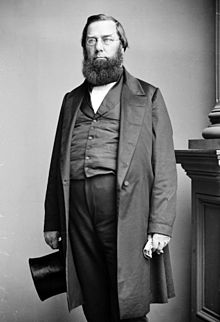George Perkins Marsh
| George Perkins Marsh | |
|---|---|
 |
|
| 15th United States Ambassador to Italy | |
|
In office June 23, 1861 – July 23, 1882 |
|
| Appointed by | Abraham Lincoln |
| Preceded by | John Moncure Daniel |
| Succeeded by | William Waldorf Astor |
| 3rd United States Minister Resident to the Ottoman Empire | |
|
In office March 11, 1850 – December 19, 1853 |
|
| Appointed by | Zachary Taylor |
| Preceded by | Dabney Smith Carr |
| Succeeded by | Carroll Spence |
| Member of the U.S. House of Representatives from Vermont's 3rd district |
|
|
In office March 4, 1843 – 1849 |
|
| Preceded by | Horace Everett |
| Succeeded by | James Meacham |
| Personal details | |
| Born |
March 15, 1801 , US |
| Died | July 23, 1882 (aged 81) Vallombrosa, Italy |
| Political party | Whig, Republican |
| Signature | |
George Perkins Marsh (March 15, 1801 – July 23, 1882), an American diplomat and philologist, is considered by some to be America's first environmentalist and the precursor to the sustainability concept, although "conservationist" would be more accurate. The Marsh-Billings-Rockefeller National Historical Park in Vermont takes its name, in part, from Marsh.
George Perkins Marsh was born in , to a prominent family. His father, Charles Marsh, had been a member of the U.S. House of Representatives. George Marsh graduated from Phillips Academy, Andover, Massachusetts, in 1816 and from Dartmouth College with highest honors in 1820. He studied law in Burlington, Vermont, was admitted to the bar in 1825, and practiced law in Burlington. He also devoted himself to philological studies. In 1835 he was appointed to the Executive Council of Vermont, and from 1843 to 1849 was a Whig representative in Congress. He served as an editor of Ancient Monuments of the Mississippi Valley which was published in 1848.
In 1849 President Zachary Taylor appointed Marsh United States minister resident in the Ottoman Empire. He rendered valuable service to the cause of civil and religious toleration in that empire. In 1852–1853, he discharged a mission to Greece in connection with the imprisonment of American missionary Jonas King. He accomplished this task with a vigor that surprised the diplomats of Athens and showed a masterly knowledge of the Greek constitution and legislation, as well as of international law.
Marsh was elected a member of the American Antiquarian Society in 1851.
...
Wikipedia
